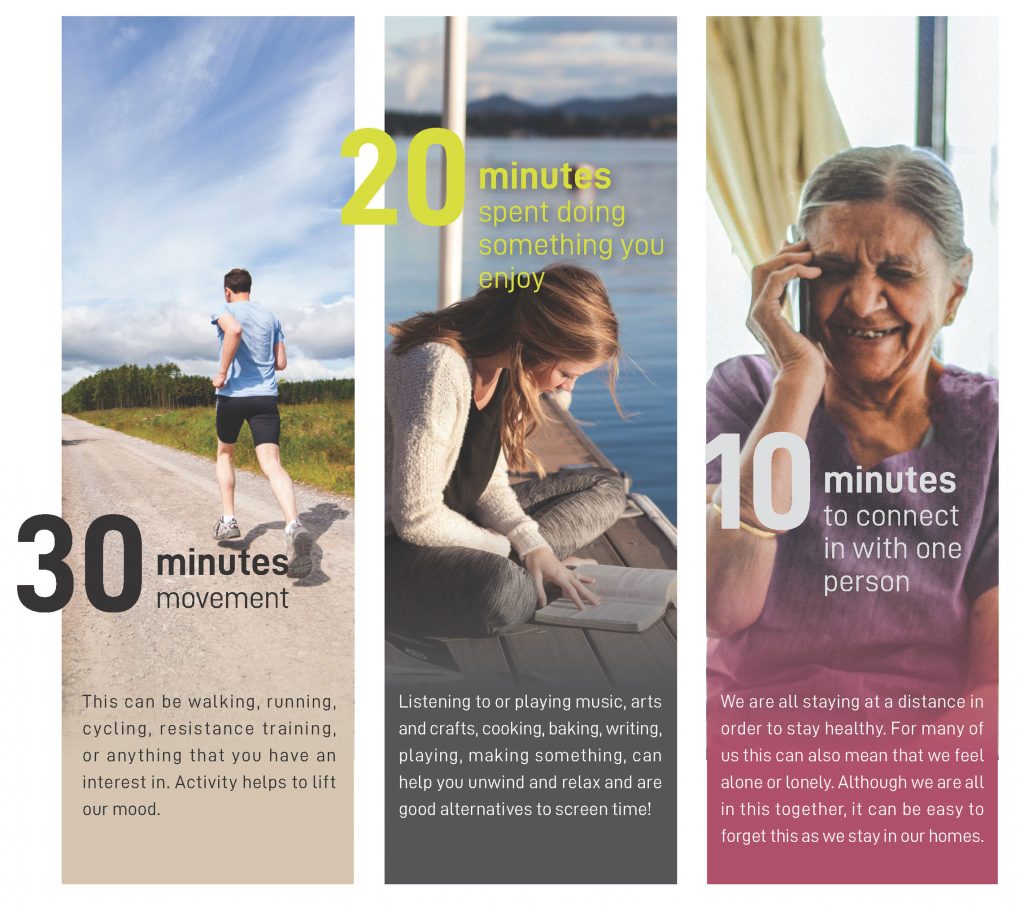 The World Health Organisation defines Mental Health ‘as a state of well-being in which every individual realizes his or her own potential, can cope with the normal stresses of life, can work productively and fruitfully, and is able to make a contribution to her or his community’. Although we have come very far in our understanding of mental health when I use this definition in my work many young people are surprised by it. Many still view good mental health as something you wake up with each day or just have automatically as a matter of luck or circumstance. Sometimes there is little or no recognition and understanding that just as we eat, drink, sleep, move and take all the other necessary steps every single day in order to stay healthy we also have to do the same to maintain good mental health.
The World Health Organisation defines Mental Health ‘as a state of well-being in which every individual realizes his or her own potential, can cope with the normal stresses of life, can work productively and fruitfully, and is able to make a contribution to her or his community’. Although we have come very far in our understanding of mental health when I use this definition in my work many young people are surprised by it. Many still view good mental health as something you wake up with each day or just have automatically as a matter of luck or circumstance. Sometimes there is little or no recognition and understanding that just as we eat, drink, sleep, move and take all the other necessary steps every single day in order to stay healthy we also have to do the same to maintain good mental health.
Working predominantly with adolescents between the ages of 12 to 18 as a guidance counsellor I am keenly aware of the challenges they face and how they approach their mental health. My work includes supporting students both proactively as well as reactively, in order words, in the first instance I work with my colleagues to promote awareness and encourage good habits for positive mental health as well as supporting students through personal counselling who may be in crisis or need individual support. With this in mind I wanted to do something in the early weeks of 2021 which I hoped would help us to come together as a school community to bring our focus back to ourselves and our mental health. As this pandemic has raged and disrupted every aspect of our lives some positive things have come out of it. One has been the importance of working proactively to maintain good mental health and the open dialogue around this which creates greater awareness in society. The second, in case we needed to be reminded, is the recognition of the huge significance and impact of being together with our loved ones and that our connection to other people helps us not just to survive in life but to thrive.
3-2-1 came about because I wanted to marry both these ideas and to create an energy and momentum after the dark and difficult weeks of January 2021. Like so much in life the theory is easier than the practice and this is never more relevant that in working in the area of mental health. In order to improve our mental health we must look at what is realistically achievable for each of us as individuals and then take one small step at a time in the direction of our goal. If the steps are too big, we are more likely to fail. We must also remember that success is not glamorous celebrations on podiums or awards ceremonies; they are just the public recognition for the countless small steps taken on the path to success and in particular for getting back up again each time you fall. We should also try not to confuse success with winning. They are not the same thing. Success is trying. And the more meaningful and personal reward for this is developing your own agency and self-efficacy and the self-confidence and positive feelings that go with that.

This notion of taking small steps to overcome challenges and empowering people is central to 3-2-1. Working on our mental health will not make the challenges in life or our problems disappear but it will help us to develop resilience so that as the WHO definition says we will be able to cope better with what life throws at us. 3-2-1 also plays a psychoeducational role in that it teaches us how we can improve our mental health and encourages meaningful conversation and dialogue in our school community which in turn creates the aforementioned greater awareness and brings us together.
 One of the biggest issues I face in my work is the stigma, ignorance and prejudice that can still surround the area of mental health. It can be very reassuring when we are struggling with our mental health to know that we are absolutely not alone in how we feel, we are not different to everybody else and that there is lots of help and support out there. This is why it was so important to encourage the participation of the entire school community so that we could all come together and take ownership of our mental health and in doing so acknowledge that we are all vulnerable to becoming overwhelmed and getting knocked down by life. We go through innumerable feelings as human beings, some of them pleasant and some of them not so pleasant. At times we can all feel anxious, sad, low, unhappy, upset and a whole host of other unpleasant feelings but it is possible to cope with them and manage them better. The first step in doing this is coming together and saying that it is okay to feel like this and don’t worry you are not alone.
One of the biggest issues I face in my work is the stigma, ignorance and prejudice that can still surround the area of mental health. It can be very reassuring when we are struggling with our mental health to know that we are absolutely not alone in how we feel, we are not different to everybody else and that there is lots of help and support out there. This is why it was so important to encourage the participation of the entire school community so that we could all come together and take ownership of our mental health and in doing so acknowledge that we are all vulnerable to becoming overwhelmed and getting knocked down by life. We go through innumerable feelings as human beings, some of them pleasant and some of them not so pleasant. At times we can all feel anxious, sad, low, unhappy, upset and a whole host of other unpleasant feelings but it is possible to cope with them and manage them better. The first step in doing this is coming together and saying that it is okay to feel like this and don’t worry you are not alone.
The sense of community and everyone taking these steps together got me out of the house for my exercise more than once during the not untypically cold and wet week that we ran it in February 2021! And I did feel the better for it! For anyone reading this, I would encourage you to give it a go, one small step at a time and see where it takes you. And most importantly if it feels like you can’t take a small step right now that’s okay too, just know that if you need help it’s out there.
 The World Health Organisation defines Mental Health ‘as a state of well-being in which every individual realizes his or her own potential, can cope with the normal stresses of life, can work productively and fruitfully, and is able to make a contribution to her or his community’. Although we have come very far in our understanding of mental health when I use this definition in my work many young people are surprised by it. Many still view good mental health as something you wake up with each day or just have automatically as a matter of luck or circumstance. Sometimes there is little or no recognition and understanding that just as we eat, drink, sleep, move and take all the other necessary steps every single day in order to stay healthy we also have to do the same to maintain good mental health.
The World Health Organisation defines Mental Health ‘as a state of well-being in which every individual realizes his or her own potential, can cope with the normal stresses of life, can work productively and fruitfully, and is able to make a contribution to her or his community’. Although we have come very far in our understanding of mental health when I use this definition in my work many young people are surprised by it. Many still view good mental health as something you wake up with each day or just have automatically as a matter of luck or circumstance. Sometimes there is little or no recognition and understanding that just as we eat, drink, sleep, move and take all the other necessary steps every single day in order to stay healthy we also have to do the same to maintain good mental health.
 One of the biggest issues I face in my work is the stigma, ignorance and prejudice that can still surround the area of mental health. It can be very reassuring when we are struggling with our mental health to know that we are absolutely not alone in how we feel, we are not different to everybody else and that there is lots of help and support out there. This is why it was so important to encourage the participation of the entire school community so that we could all come together and take ownership of our mental health and in doing so acknowledge that we are all vulnerable to becoming overwhelmed and getting knocked down by life. We go through innumerable feelings as human beings, some of them pleasant and some of them not so pleasant. At times we can all feel anxious, sad, low, unhappy, upset and a whole host of other unpleasant feelings but it is possible to cope with them and manage them better. The first step in doing this is coming together and saying that it is okay to feel like this and don’t worry you are not alone.
One of the biggest issues I face in my work is the stigma, ignorance and prejudice that can still surround the area of mental health. It can be very reassuring when we are struggling with our mental health to know that we are absolutely not alone in how we feel, we are not different to everybody else and that there is lots of help and support out there. This is why it was so important to encourage the participation of the entire school community so that we could all come together and take ownership of our mental health and in doing so acknowledge that we are all vulnerable to becoming overwhelmed and getting knocked down by life. We go through innumerable feelings as human beings, some of them pleasant and some of them not so pleasant. At times we can all feel anxious, sad, low, unhappy, upset and a whole host of other unpleasant feelings but it is possible to cope with them and manage them better. The first step in doing this is coming together and saying that it is okay to feel like this and don’t worry you are not alone.